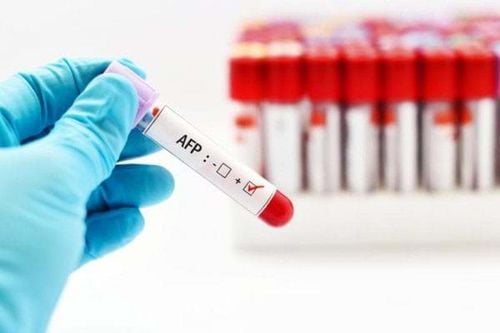This is an automatically translated article.
Cytomegalovirus is a very common virus, normally CMV does not affect health, but for some subjects, especially pregnant women, CMV infection can cause permanent damage to the fetus. So what is the CMV test?
1. What is a CMV test?
CMV stands for Cytomegalovirus, a virus that is very common but infected people rarely show specific symptoms. Statistics in the United States show that up to 50-85% of people are infected with CMV, the most common object is children or adolescents.
CMV belongs to the same family as viruses such as Epstein-Barr, herpes, and varicella (the causative agent of chickenpox, shingles). Once inside the cell, the virus replicates and multiplies in the cell nucleus. Replication produces large inclusions in the nucleus and many smaller inclusions in the cytoplasm.
In humans, CMV has been found to multiply in the cells of various organs such as salivary glands, liver, kidneys, lungs, and lymphocytes. In patients with CMV infection, the virus is found in many bodily secretions such as urine, blood, saliva, semen, breast milk, cerebrospinal fluid, vaginal secretions, etc. to others through routes such as contact with blood or secretions, sex, or mother-to-child transmission.
After going through the primary viral phase, CMV can go into dormant state (latent stage) to remain in the body for a lifetime without causing any symptoms and at risk. Recurrence when the body's immune system is significantly weakened.
The CMV test is a test that checks for the presence of Cytomegalovirus in a patient's blood. Because the disease does not cause too many health effects if the person infected with CMV is a teenager or healthy person, there is usually no need to be tested. Most cases that need to be tested for CMV are pregnant women, immunocompromised people or patients who need an organ transplant.
Especially, women who are newly infected or have been infected with CMV before and have relapsed have a very high risk of causing congenital infection to the baby. Statistics show that up to 10% of newborns with congenital CMV infection lead to permanent damage such as mental retardation and hearing abnormalities. In addition, fetal CMV infection can lead to cerebral palsy, microcephaly, hydrocephalus, growth retardation, and even death.
Infectious pathogens that adversely affect the fetus are collectively referred to as TORCH, including Toxoplasmosis, Other (Other), Rubella, CMV, Herpes.
2. Cytomegalovirus is transmitted by which way?
CMV can be transmitted to people through many different ways, but it is common in the following cases:
Blood transfusion, organ transplant: The process of CMV infection can be caused by the virus existing in blood, blood products or organs. of the donor; Mothers are infected with CMV and pass it on to their babies during pregnancy and during childbirth because the virus is present in vaginal secretions or is transmitted through breast milk while breastfeeding; In addition, in the neonatal period, children can be infected with CMV through daily care activities. Direct contact with infected body secretions such as saliva, feces, urine, tears, blood, semen, vaginal fluid...

Cytomegalovirus lây qua đường truyền máu, vì vậy cần xét nghiệm CMV giúp phát hiện và điều trị kịp thời
3. Who needs a CMV test?
3.1. CMV Testing for Suspected People CMV Testing is done when a person has suspected CMV infection. The virus is common in pregnant women, children, adolescents and some high-risk groups such as gay men, organ transplant recipients and HIV/AIDS patients.
A weakened immune system is an opportunity for viruses to attack and invade the body, including CMV virus and cause many different diseases and complications. Immunocompromised people are usually HIV/AIDS patients, organ transplant recipients, bone marrow transplant recipients...
If there are symptoms of CMV infection, CMV testing will help determine if it's true. disease or not. CMV test can be done by different methods such as autoimmunity, PCR with blood samples or other body fluids.
3.2. CMV testing for pregnant women CMV testing is essential for pregnant women, especially if the presence of even very small IgM antibodies can suggest viral reactivation and viral infection for the unborn baby.
Women who are found to be infected with CMV in the first trimester of pregnancy will be considered by the doctor and ordered to perform amniocentesis to test for CMV infection or not. In addition, the amniotic fluid test can also help detect other viral infections.
3.3. CMV test for newborn If the doctor suspects that the baby has congenital viral infection, he will order CMV test in the first 3 weeks after birth. This test should be done as soon as possible to determine whether the child has a congenital viral infection or a viral infection from the environment.
4. Notes when testing for CMV
There are different methods of testing for CMV including:
Direct observation under the microscope; Virus isolation; CMV - DNA test by PCR technique; Testing for IgM/IgG antibodies by serological method, this technique can be performed simultaneously to detect infection with other viruses such as influenza, Epstein-Barr virus... when the patient has flu symptoms (including including fatigue, sore throat, swollen glands, headache, muscle and joint pain...)

Xét nghiệm CMV có thể được thực hiện bằng cách quan sát trực tiếp dưới kính hiển vi
At that time, a CMV test for antibodies should be performed to accurately determine the viral infection. However, the cost of testing for CMV virus antibodies is relatively high and often looks for IgG and IgM antibodies.
Currently, the CMV test technique by PCR method has high sensitivity and specificity and is applied to accurately diagnose viral infection.
Specimens for CMV testing:
With virus isolation culture tests, the specimen can be urine, sputum, or saliva. The process of culturing the virus in a virus laboratory usually takes about 3-7 days; For an antibody or PCR test, the doctor will take a sample of blood from a vein. In particular, for the CMV test for IgG/IgM antibodies, the doctor will ask the patient to return 2 to 4 weeks from the first sample collection for additional specimens.
The presence of anti-CMV antibodies in the first specimen suggests current or current CMV infection. If the number of antibodies (called antibody titres) is increased within 2-4 weeks at the time of additional testing helps identify the patient with current or recent CMV infection.
If chronic CMV infection (anti-CMV antibodies are present but unchanged for a long time) may recur in immunocompromised patients. In people with primary CMV infection, IgM antibodies can be detected very soon after 4-7 weeks of infection and persist for about 16-20 weeks, while IgG antibodies appear later but last longer (may last longer). many years).
Laboratory Department of Vinmec International General Hospital includes a full range of specialized fields: Biochemistry, Hematology - Blood Transfusion, Microbiology - Parasitology and Pathology with a team of qualified medical professionals, experienced to bring the most accurate diagnosis.
All tests are operated according to the standard testing procedures of the Ministry of Health, strict quality control.
Sampling, safe transport of test samples Ensure test quality Return results as soon as possible, actively support doctors for effective treatment Current semi-automatic combined automatic testing equipment Modern and synchronous technology of famous and reputable firms in the field of testing in the world such as Beckman Coulter (USA), Roche (Switzerland):
Modern pneumatic system for transporting specimens and returning results by compressed air of Beckman - Coulter company (USA) avoids contamination, confusion of patient samples, and at the same time avoids the impact of the environment on patient samples, giving accurate test results with fast result return time. VITEK2 COMPACT Biormerieux automatic identification and antibiotic system for performing microbiological tests is the system of equipment being used at leading hospitals in Hanoi and Hai Phong. Pathology: The first BenchMark XT automatic in situ hybridization and immunohistochemistry staining machine in Hai Phong identifies the origin and classifies different cancers to help accurately diagnose cancer types.
Please dial HOTLINE for more information or register for an appointment HERE. Download MyVinmec app to make appointments faster and to manage your bookings easily.













